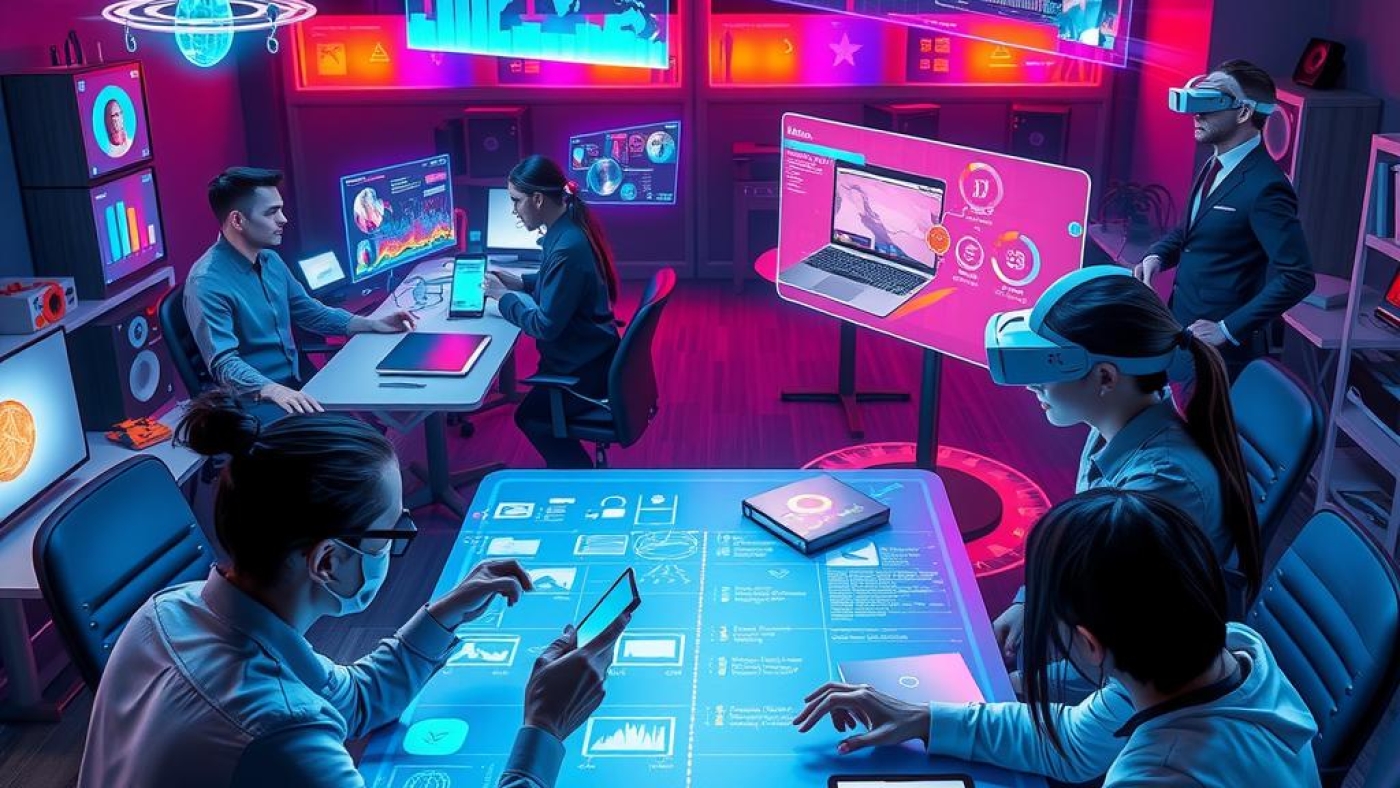In an era where employee development is paramount for maintaining competitive advantage, the need for effective training solutions has never been more critical. Traditional methods of corporate training often fall short in engagement and retention, leaving organizations searching for innovative alternatives. Enter the realm of augmented reality (AR) enterprise training platforms—an exciting frontier that promises to revolutionize how companies approach skills enhancement and knowledge transfer. These immersive technologies not only captivate learners but also foster a more profound understanding of complex concepts through realistic simulations.
As businesses strive to adapt to rapidly changing environments, they face the challenge of equipping their workforce with practical skills that can be immediately applied in real-world scenarios. The current landscape presents a plethora of choices when it comes to selecting an AR training platform, making it crucial for decision-makers to understand the nuances between various offerings. This article aims to demystify these options by presenting a comprehensive comparison of leading AR enterprise training solutions available today.
By delving into key features such as user experience, content creation capabilities, integration with existing systems, and analytics tools, organizations will gain valuable insights into which platform best aligns with their specific needs. Furthermore, this exploration underscores the transformative potential that virtual learning environments hold—not just as standalone modules but as integral components woven into broader corporate strategies aimed at enhancing employee performance.
Navigating this technological landscape may initially seem overwhelming; however, understanding these platforms’ unique attributes empowers businesses to make informed decisions that can significantly impact overall effectiveness in employee onboarding and continuous education initiatives. In doing so, companies not only enhance their operational efficiency but also cultivate a culture dedicated to lifelong learning—a necessary ingredient for success in today’s fast-paced world.
Join us as we embark on this journey through the diverse offerings within AR enterprise training platforms; discover how each solution stands out while addressing your organization’s pressing challenges related to modern corporate training practices.

Key Insights:
-
Emerging Trends in AR Training Platforms: The rise of AR enterprise training platforms marks a significant shift in how organizations approach employee development. By incorporating augmented reality into corporate training, these platforms not only enhance engagement but also provide immersive experiences that traditional methods lack. Companies leveraging this technology can expect improved skills enhancement and knowledge retention among their workforce, ultimately leading to a more competent team capable of adapting to rapid changes in the business landscape.
-
Comparative Analysis of Leading Platforms: As organizations evaluate various options for effective employee development, it becomes crucial to conduct a thorough comparison of available AR training solutions. Each platform brings unique features and capabilities tailored for different industries and learning objectives. By assessing strengths and weaknesses across these enterprise training platforms, companies can identify which specific functionalities align best with their training needs, thereby making informed decisions about investment in technology-driven learning solutions.
-
Impact on Efficiency and Cost-Effectiveness: Utilizing an AR enterprise training platform offers substantial advantages beyond heightened engagement levels; it significantly boosts efficiency while reducing overall training costs. Organizations adopting these innovative tools often witness transformative changes within their workforce dynamics, fostering a culture centered around continuous learning and adaptability. This transition not only enhances the effectiveness of corporate education but also positions businesses competitively by equipping employees with essential skills through advanced virtual learning scenarios designed specifically for diverse operational contexts.

The Revolution of Employee Training
Augmented Reality’s Role in Corporate Learning
In an era where technology is reshaping every facet of our lives, the corporate world has begun to embrace augmented reality (AR) as a transformative tool for employee training and development. The shift towards utilizing AR in the context of training platforms marks a new chapter in how organizations approach skill enhancement. By integrating immersive experiences into their training programs, companies can engage employees more effectively than ever before. For instance, using an AR enterprise training platform allows employees to interact with virtual objects overlaid on their real-world environment. This hands-on approach not only enhances understanding but also increases retention rates significantly compared to traditional learning methods.
Personalized Learning Experiences
The personalized nature of AR technology enables companies to tailor their corporate training sessions according to individual employee needs and learning styles. Unlike conventional methods that often adopt a one-size-fits-all approach, AR enterprise training platforms facilitate customized simulations that cater specifically to various roles within an organization. Employees can practice complex procedures or scenarios relevant to their positions without the risks associated with real-life errors—thereby promoting confidence and competence in skills enhancement efforts. Furthermore, this targeted methodology fosters greater motivation among participants as they see direct correlations between the augmented experiences they undergo and their daily tasks.
Bridging Knowledge Gaps Through Virtual Learning
One of the most compelling advantages offered by AR technology is its ability to bridge knowledge gaps across diverse teams within modern organizations. When deploying an AR enterprise training platform, businesses can ensure that all employees have equal access to vital resources regardless of geographic location or experience level. With virtual environments simulating real-world challenges, learners are empowered not just with theoretical knowledge but practical insights applicable immediately in their work settings. Additionally, continuous feedback mechanisms integrated into these platforms allow trainers and supervisors alike to monitor progress closely—ensuring timely interventions when necessary while nurturing ongoing professional growth.
Future Trends: Adoption and Integration
As we look toward the future of corporate learning, it becomes clear that the integration of technologies like augmented reality will become increasingly prevalent within employee development strategies across industries worldwide. Companies keen on staying ahead must recognize the importance of adopting innovative solutions such as AR training platforms, which promise improved engagement levels while adhering closely aligned objectives around efficiency gains through enhanced performance outcomes amongst staff members trained under these systems’ frameworks—a crucial competitive advantage moving forward! As organizations continue investing resources into developing comprehensive approaches toward workforce education via emerging tech trends including virtual learning environments powered by advanced capabilities found exclusively through specialized software offerings designed explicitly for enhancing traditional business practices today’s landscape demands nothing short from excellence driven results achieved collaboratively alongside empowered personnel ready tackle challenges head-on tomorrow!
Understanding the Landscape of AR Enterprise Training Solutions
Evaluating Features and Capabilities for Optimal Business Fit
In today’s fast-paced business environment, organizations are increasingly turning to AR enterprise training platforms to enhance employee development and facilitate skills enhancement. These platforms leverage augmented reality (AR) technology to create immersive virtual learning experiences that engage employees in a way traditional methods cannot. A comparative analysis of leading AR solutions reveals distinct features, strengths, and weaknesses that businesses must consider when selecting the right platform. For instance, some platforms excel in providing realistic simulations tailored for complex operational tasks, which can significantly improve training outcomes in industries like manufacturing or healthcare. However, these advanced features may come with higher costs or require specialized hardware that could be prohibitive for smaller enterprises.
Key Features Driving Adoption
The Importance of Usability and Integration
When evaluating AR enterprise training platforms, usability is a critical factor influencing adoption rates. Platforms designed with intuitive interfaces ensure that users can navigate them easily without extensive training themselves—leading to quicker onboarding processes and enhanced user satisfaction. Furthermore, integration capabilities with existing corporate systems are paramount; seamless connectivity allows businesses to incorporate these innovative tools into their current workflows effortlessly. Companies looking for robust data analytics features should also prioritize solutions offering comprehensive tracking metrics on user engagement and performance during training sessions as this data can provide insights into areas needing improvement.
Strengths vs Weaknesses: A Balanced Perspective
Making Informed Choices Based on Organizational Needs
While many AR enterprise training platforms boast impressive strengths such as scalability and interactivity, it is essential to weigh these against potential weaknesses like cost implications or technical complexity. For example, while high-end solutions might offer unparalleled realism through 3D modeling techniques beneficial for intricate skill sets required in fields such as aviation or medicine, they may not align with the budget constraints faced by smaller firms seeking effective yet economical options for corporate training initiatives. Therefore, organizations must conduct thorough evaluations based on specific needs—whether prioritizing cutting-edge technological advancements or opting for straightforward implementations conducive to quick deployments.
Future Trends Shaping AR Training Platforms
Anticipating Changes in Corporate Learning Environments
As we look forward toward emerging trends within the realm of augmented reality applications in employee development programs globally shifts towards more personalized learning approaches gain traction among practitioners aiming at enhancing retention rates through adaptive content delivery mechanisms specific to learner profiles rather than one-size-fits-all methodologies prevalent earlier on similar educational fronts! Moreover artificial intelligence’s role intertwining seamlessly within existing frameworks promises even greater dynamism enabling real-time feedback loops fostering iterative improvements across various aspects defining efficacious corporate education landscapes overall!
By understanding these dynamics surrounding various competitive offerings available currently within marketplace segments focusing primarily upon key functionalities aligning closely alongside organizational goals will empower decision-makers ultimately ensuring optimal choices made resonate effectively throughout entire workforce cultures thus paving pathways toward sustained growth success navigating evolving landscapes ahead confidently!
The Transformative Power of Augmented Reality in Corporate Learning
Enhancing Productivity and Fostering Continuous Improvement
The integration of augmented reality (AR) into corporate training through an AR enterprise training platform offers substantial benefits that extend far beyond mere engagement. At the heart of this transformation is a marked increase in productivity. Traditional training methods often involve lengthy sessions that can disrupt daily operations, leading to lost time and decreased efficiency. In contrast, AR platforms provide immersive experiences that allow employees to learn at their own pace while still fulfilling their job responsibilities. This flexibility not only helps maintain workflow but also empowers workers with immediate access to relevant information when needed, thus enhancing overall performance.
Moreover, the implementation of technology in training promotes a culture of continuous learning within organizations. By utilizing an AR enterprise training platform, companies signal their commitment to employee development and skills enhancement, which are vital for adapting to rapidly changing market demands. Employees who regularly engage with interactive learning modules are more likely to retain knowledge and apply it effectively on the job. This ongoing process fosters an environment where team members feel encouraged to pursue personal growth actively—a crucial factor for long-term retention and satisfaction.
In addition to improved productivity and learning culture, the cost-effectiveness associated with using augmented reality cannot be overstated. Implementing traditional corporate training programs often incurs significant costs related to materials, instructors, travel expenses for off-site sessions, or even downtime during extensive workshops. However, by switching to an innovative AR enterprise training platform, organizations can dramatically reduce these overheads while simultaneously providing high-quality educational content tailored specifically for their workforce needs.
Furthermore, as businesses increasingly embrace remote work arrangements following recent global events like the pandemic, virtual learning solutions have become essential tools for maintaining employee engagement across dispersed teams. With augmented reality applications enabling rich simulations that mirror real-world scenarios—without requiring physical presence—companies can ensure all employees receive equal opportunities for professional development regardless of location.
Ultimately, leveraging AR technology in your corporate education strategy equips your workforce with superior tools necessary for thriving amidst competition while promoting both individual accomplishment and collective success within your organization’s framework.
A Comprehensive Comparison of AR Training Platforms for Enterprises: Which One Fits Your Needs?
As organizations navigate the complexities of employee development, adopting an AR enterprise training platform can significantly enhance corporate training initiatives. Among the leading options available, three standout platforms—XYZ AR Solutions, InnovateAR, and LearnAR—offer unique features that cater to different aspects of skills enhancement and knowledge retention.
XYZ AR Solutions excels in providing industry-specific simulations that immerse employees in real-world scenarios. This platform’s strength lies in its ability to create tailored content for various sectors such as healthcare, manufacturing, and retail. By leveraging augmented reality technology, XYZ enables learners to practice skills within a safe environment without the risks associated with on-the-job training. Its analytics dashboard further aids organizations by tracking progress and identifying skill gaps among employees.
InnovateAR stands out due to its user-friendly interface and extensive library of pre-built training modules. Designed for ease of use, companies can quickly implement this training platform, allowing them to focus on enhancing workforce capabilities rather than spending excessive time developing content from scratch. The incorporation of gamification elements increases engagement levels while reinforcing learning objectives through interactive challenges—a feature particularly beneficial for younger generations entering the workforce.
LearnAR offers robust customization options that allow enterprises to develop bespoke training experiences tailored specifically to their organizational needs. With advanced integration capabilities into existing Learning Management Systems (LMS), this AR enterprise training platform ensures a seamless transition from traditional methods to virtual learning environments. Furthermore, LearnAR’s mobile compatibility allows employees access anytime and anywhere—a crucial feature as remote work becomes increasingly prevalent.
FAQ:
Q: What is an AR enterprise training platform?
A: An AR enterprise training platform utilizes augmented reality technology designed specifically for corporate education purposes, providing immersive learning experiences that enhance employee development.
Q: How does augmented reality improve corporate training?
A: Augmented reality enhances corporate training by creating engaging simulations that boost skills enhancement and knowledge retention compared to conventional methods.
Q: Why should my organization consider using an AR-based solution?
A: Organizations should consider utilizing an AR-based solution because it fosters continuous learning while improving efficiency and cost-effectiveness within employee development programs.

Leave A Comment